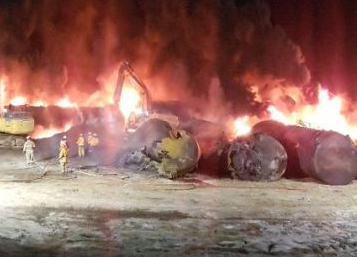MONTREAL — Two weeks after 3,200 Canadian National Railway workers carried out their Nov. 19-26 strike targeting unsafe conditions pushed by the bosses, a Canadian Pacific crude oil train derailed and caught fire Dec. 9 near the town of Guernsey in Saskatchewan.

No one was injured, but it took over 24 hours to extinguish the flames. It will take weeks to clean up the estimated 400 million gallons of oil that poured out.
“We were very scared,” Melanie Loessl told the Saskatoon Star Phoenix after she came home that night to see the fire burning near her driveway. “We didn’t know if the cars would actually blow up or what they would do.”
“There have been a number of derailments across North America that have seen oil cars catch fire since the 2013 disaster in Lac-Mégantic,” the Globe and Mail reported Dec. 9. An unattended Montreal, Maine and Atlantic oil train derailed, exploded and burned in that catastrophe, killing 47 people and destroying the town’s downtown area.
Since the 2013 disaster the amount of oil being transported by Canadian rail companies has nearly doubled.
Canadian Pacific Railway, Canada’s largest rail company, announced Nov. 20 it had signed a deal to buy the Central Maine and Quebec Railway that runs through Lac-Mégantic. The CMQ took ownership of the tracks after Montreal, Maine and Atlantic went bankrupt. Under public pressure Central Maine has refrained from running oil trains through Lac-Mégantic, but continues to transport other toxic and volatile chemicals.
Canadian Pacific bosses’ acquisition of Central Maine and Quebec gives them access to the largest ports on Canada’s Atlantic coast — and to haul crude oil through Lac-Mégantic to the Irving Oil refinery in Saint John, New Brunswick.
The “strike for safety” by Canadian National workers showed that since the Lac-Mégantic disaster safety conditions have continued to worsen. It highlighted what rail workers face today — a cost-cutting campaign by the railroad bosses to reduce crew size, slash rest time, force more overtime and to twist workers’ schedules to put profits ahead of workers’ life and limb. Teamster union members are now in the process of debating and voting on the contract union officials negotiated with the company.
Lawsuit blames CP for Lac-Mégantic
The highly volatile crude oil involved in the Lac-Mégantic disaster was transported by Canadian Pacific to Quebec from the Bakken shale oil fields in North Dakota. The tanker cars were deliberately mislabeled to lower shipping costs. Since then company bosses have denied any liability for the disaster, claiming its responsibility ended when it handed the train over to Montreal, Maine and Atlantic.
Not so, says a $200 million lawsuit filed against both Canadian Pacific and former MMA bosses by 5,000 people who lost loved ones, homes or businesses. The oil shipment “was all about driving profits and cutting costs for CP — focusing on the bottom line to the detriment of communities along the railroad, including Lac-Mégantic,” Joel Rochon, one of the plaintiffs’ lawyers, told the Canadian Press after the suit was filed.
Twenty-five other companies originally named in the 2017 lawsuit were dropped when they agreed, along with the Canadian government, to contribute to a $450 million fund for the victims. Canadian Pacific bosses refused to settle.
Tom Harding, the locomotive engineer and member of the United Steelworkers who constituted the “crew” of one who parked the train the night of the Lac-Mégantic disaster was also named in the lawsuit.
In 2018 a working-class jury found Harding and co-worker Richard Labrie not guilty on frame-up charges brought by the government of criminal negligence. Their acquittal reflected the widespread view among working people that Harding and Labrie were scapegoats for the rail bosses, Ottawa and Transport Canada.
In a statement issued backing the Canadian National strikers, the Coalition of Citizens and Organizations Committed to Railway Safety in Lac-Mégantic reiterated how they had supported Harding against the frame-up. They said the rail unionist was “a man unjustly accused by an industry insensitive and ungrateful to its workers, yet so affable towards its shareholders.”
Harding registered another victory Nov. 28 when a judge in Lac-Mégantic ruled in favor of his motion to be dropped from the lawsuit. In return, he agreed to testify for those suing Canadian Pacific when the trial begins next year.
Meanwhile, downtown Lac-Mégantic remains a massive vacant lot. Tanker cars with dangerous chemicals continue to roll through the town every day and night. The building of a rail bypass — promised by Ottawa and the Quebec government under pressure from the population and activist groups like the Citizens Coalition — hasn’t even begun.

